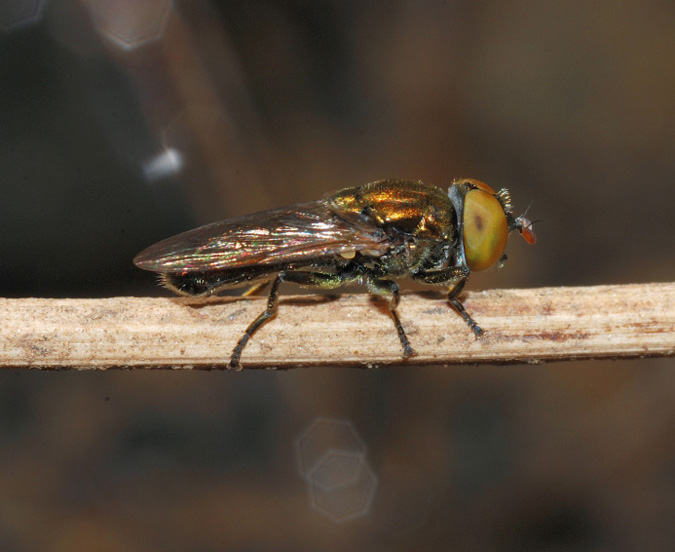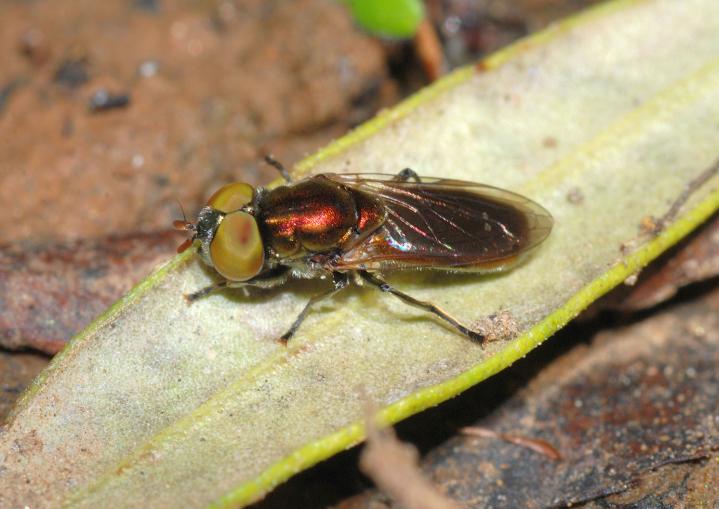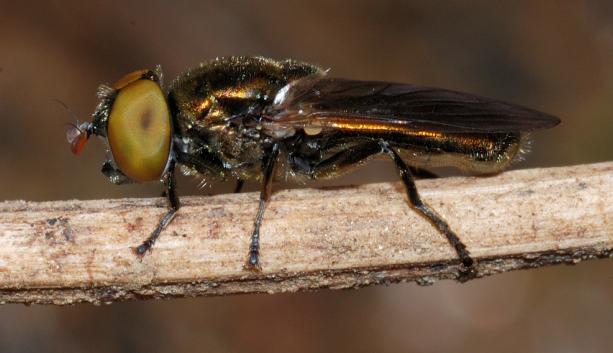Diptera.info :: Identification queries :: Diptera (adults)
|
Syrphidae - Riponnensia splendens, actually?
|
|
| Filex |
Posted on 05-01-2008 13:46
|
|
Member Location: Posts: 70 Joined: 22.08.07 |
Hi, I would appreciate any help to identify this fly. I found it several times in September 2007 close to ponds in a cork-oak forest in Palam?s, Girona (NE Spain). It looks to me like it could belong to Stratiomyiidae. It has a very characteristic eye colour. Thanks Miquel Filex attached the following image:  [121.09Kb] Edited by Filex on 06-01-2008 20:51 |
|
|
|
| Xespok |
Posted on 05-01-2008 13:48
|
|
Member Location: Debrecen, Hungary Posts: 5551 Joined: 02.03.05 |
It is a Syrphid. Change the title to attract the Syrphid guys.
Gabor Keresztes Japan Wildlife Gallery Carpathian Basin Wildlife Gallery |
| Zeegers |
Posted on 05-01-2008 14:00
|
|
Member Location: Soest, NL Posts: 19267 Joined: 21.07.04 |
Looks like Orthonevra Theo |
|
|
|
| Gerard Pennards |
Posted on 05-01-2008 16:01
|
|
Member Location: Amersfoort Posts: 1914 Joined: 07.06.04 |
Yep, Theo's right, and I think it's a male Orthonevra nobilis! greetings, Greetings, Gerard Pennards |
|
|
|
| Filex |
Posted on 06-01-2008 20:51
|
|
Member Location: Posts: 70 Joined: 22.08.07 |
May it be Riponnensia splendens instead? |
|
|
|
| Andre |
Posted on 06-01-2008 22:27
|
|
Member Location: Tilburg, the Netherlands Posts: 2111 Joined: 18.07.04 |
Crossed my mind too... Just like Lejogaster tarsata (I found specimens with dark tarsae, and the shape of the antennae can vary and could be this pic doesn't show it from the best angle). But this species has the eyes separated in the male. Anyway, I am a bit confused though, by the reddish looking antennae (flash?). A 100% ID is risky. Edited by Andre on 09-01-2008 18:37 |
| Gerard Pennards |
Posted on 06-01-2008 23:23
|
|
Member Location: Amersfoort Posts: 1914 Joined: 07.06.04 |
Ooops, my mistake! Indeed a male Riponnensia splendens! I caught these guys myself in France, and I should know the habitus! Theo said Orthonevra and I thought (without books) it should be nobilis then. Riponnensia didn't even cross my mind.....   It's time spring starts, so we can fresh up the knowledge on live animals...   Greetings, Greetings, Gerard Pennards |
|
|
|
| Zeegers |
Posted on 07-01-2008 09:56
|
|
Member Location: Soest, NL Posts: 19267 Joined: 21.07.04 |
I'm oldfashioned, in my head Ripponensia is still an Orthonevra. It clearly insn't, but my database between my ears don't want make the necessary changes. Sorry. (Close readers will notice the 'looks like' part) |
|
|
|
| Andre |
Posted on 07-01-2008 11:35
|
|
Member Location: Tilburg, the Netherlands Posts: 2111 Joined: 18.07.04 |
I never had a longicornis in my hands... again: the agle of the pic offers some room for doubt. |
| Filex |
Posted on 08-01-2008 22:33
|
|
Member Location: Posts: 70 Joined: 22.08.07 |
I have 8 pictures of this species taken in the same place on close dates, from different orientations. They all show the red antennae, so it might not be a flash effect. I attach a second picture from a different angle. Thanks a lot for all your comments! Filex attached the following image:  [49.33Kb] |
|
|
|
| Andre |
Posted on 08-01-2008 23:31
|
|
Member Location: Tilburg, the Netherlands Posts: 2111 Joined: 18.07.04 |
Do you have a sideview of the face? |
| Filex |
Posted on 08-01-2008 23:58
|
|
Member Location: Posts: 70 Joined: 22.08.07 |
This is the most similar to a side view of the face that I have.
Filex attached the following image:  [30.9Kb] |
|
|
|
| Andre |
Posted on 09-01-2008 18:33
|
|
Member Location: Tilburg, the Netherlands Posts: 2111 Joined: 18.07.04 |
It's defenitely Riponnensia (no O. nobilis, for the eyes are meeting over a very short distance in nobilis). Because I cannot reliably estimate the length of the 3rd antennae, we will stick to R. splendens/longicornis. [Between these two, I would guess longicornis though] Would be nice to collect some next year and send them to me please.  Can you describe me the exact environment where you found them? |
| Filex |
Posted on 09-01-2008 19:47
|
|
Member Location: Posts: 70 Joined: 22.08.07 |
The environment is a cork-oak (Quercus suber) and Aleppo pine (Pinus halepensis) forest, with holm-oak (Quercus ilex) along the temporary brooks, situated near the coast (less than 4km from the shore-line, about 25 m high). See link: http://maps.google.es/maps?f=q&hl=es&geocode=&q=Palam%C3%B3s&ie=UTF8&ll=41.880042,3.11162&spn=0.029907,0.056992&t=h&z=14&om=1 The flies were found always just beside the small ponds that remain in very few places of the dried brooks even at the end of the summer. They are very shadow ponds inside the forest, with only limited sun at about midday. I have only noticed this species at the end of September. |
|
|
|
| Andre |
Posted on 09-01-2008 22:40
|
|
Member Location: Tilburg, the Netherlands Posts: 2111 Joined: 18.07.04 |
Aha, september, ofcourse! That would point to splendens, not longicornis. Longicornis is found to fly in june. Splendens from june till the end of september! Stupid of me... sorry, should have read your posting AND my literature better 
Edited by Andre on 09-01-2008 22:43 |
| Filex |
Posted on 10-01-2008 23:21
|
|
Member Location: Posts: 70 Joined: 22.08.07 |
Thank you very much Andr? for your effort to identify this fly! Miquel |
|
|
|
| Andre |
Posted on 11-01-2008 13:42
|
|
Member Location: Tilburg, the Netherlands Posts: 2111 Joined: 18.07.04 |
And you made nice pictures  Do you collect as well, or just make pictures? |
| Filex |
Posted on 13-01-2008 19:54
|
|
Member Location: Posts: 70 Joined: 22.08.07 |
Just make picture. Otherwise I would be pleased to send you some specimens. Sorry. Miquel |
|
|
|
| Andre |
Posted on 13-01-2008 23:22
|
|
Member Location: Tilburg, the Netherlands Posts: 2111 Joined: 18.07.04 |
Iberia needs more collectors  There still is so much to discover...  |
| Jump to Forum: |













